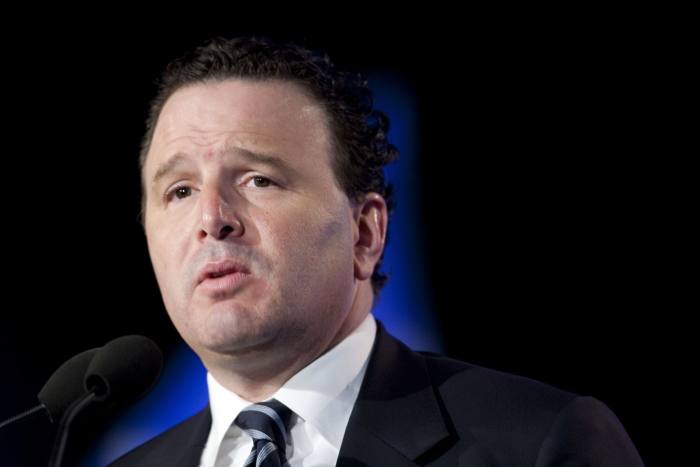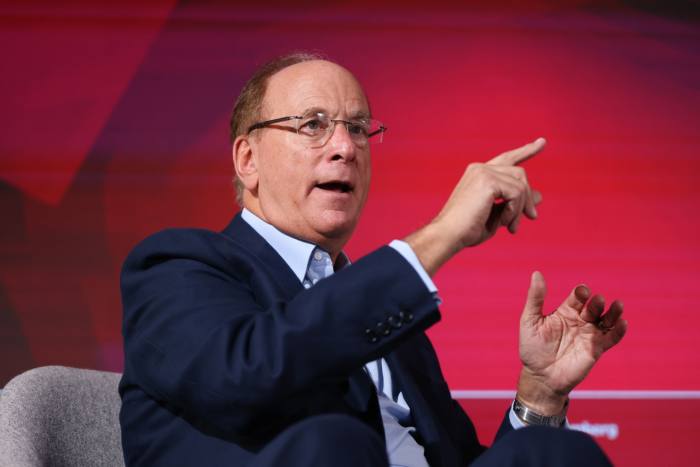One scoop start: UBS is set to enter talks with Michael Klein to unwind a deal that would have seen the Wall Street dealmaker take control of much of Credit Suisse’s investment bank, according to people with direct knowledge of the matter.

Welcome to Due Diligence, your briefing on dealmaking, private equity and corporate finance. This article is an on-site version of the newsletter. Sign up here to get the newsletter sent to your inbox every Tuesday to Friday. Get in touch with us anytime: Due.Diligence@ft.com
In today’s newsletter
BlackRock’s eight-trillion-dollar-man goes fishing
Larry Fink loves fly-fishing, music and big, transformational opportunistic mergers and acquisitions.
So DD wasn’t too surprised that the BlackRock founder’s ears perked up when Credit Suisse, the fallen banking giant where he started his Wall Street career, fell on the market for a song.
As the FT reported over a hectic weekend, BlackRock was pretty much the only alternative to a takeover by UBS (outside of liquidation). In a sign of serious intent, Fink sent his main lieutenant Rob Kapito — another Credit Suisse First Boston veteran — to see if there was a deal to be done.
“To be in the game you’ve got to play it,” Fink reportedly told his inner circle.
But after indicating it did not want to buy the whole bank, BlackRock ultimately decided to halt its work on a bid.
As Alphaville’s Robin Wigglesworth writes, the fact that BlackRock got involved in the CS situation shows that Fink still has another blockbuster deal up his sleeve, potentially a major play in wealth management.

The history of asset management industry consolidation has more slow-motion car crashes than the Fast & Furious movie franchise, but BlackRock has long proven itself in picking the right target at the right time.
The expectation has long been that Fink’s next big gambit will be an acquisition in the private capital industry — an area where BlackRock is relatively underpowered.
The mega-money manager began sniffing around Carlyle last year, the FT reported, when the private equity group was engulfed by chaos by the sudden departure of chief executive Kewsong Lee.
“They [BlackRock] want to buy an alternative manager, but I don’t think they are going to do anything sometime soon,” a person with knowledge of the discussions said in December.
Private capital is still the most likely acquisition target for BlackRock, with few opportunities even remotely similar to Credit Suisse likely to hit the market.
A major expansion into wealth management makes sense for BlackRock.
The firm is the world’s biggest manufacturer of investment products, which are primarily distributed to institutional investors. But it lacks the wealth management side of rivals such as Fidelity (whose pre-tax profits were almost a quarter higher than BlackRock’s in 2022, at $8bn).
Buying Credit Suisse would have given it a way to target the world’s upper class. The question, of course, is whether Fink’s interest was purely driven by a good bargain, or a sign of a new strategy.
Man vs. Wild: banking edition
When a group of Credit Suisse bankers gathered for a camping retreat with Bear Grylls in Sai Kung, Hong Kong, they were ostensibly there to glean wisdom from the celebrity survivalist that could be applied to a corporate setting.
Footage from the outdoor adventure trip was meant to be aired at the Swiss bank’s flagship investor conference this week in a presentation by Grylls titled “lessons learned from navigating some of the harshest environments”.
The general feeling at the conference, though, was that not even a crash course from the Man vs. Wild star could prepare them for the challenge ahead, DD’s Kaye Wiggins and the FT’s Cheng Leng report.
Despite UBS’s forced takeover of the Swiss lender, CS chief Ulrich Körner and chair Axel Lehmann have urged bankers to “continue to work as normal”.
Part of that included carrying on with the conference at Hong Kong’s five-star Conrad hotel, fittingly themed “Embracing Reality”.
On the surface, things seemed like business as usual. “If you didn’t read the news, you wouldn’t have thought anything had happened,” said Mark Kwan, an executive director of Singapore’s Straits Asset Management.
But some panels, such as “Where has all the risk gone?”, felt out of place.
And dry humour frequented private conversations, joking about whether attendees needed to pay for their own breakfast or whether the Swiss National Bank would pay, and whether bankers’ corporate cards were still working, said one attendee.
Later on Tuesday, however, the laughs were stifled: Switzerland’s finance ministry banned CS from paying deferred bonuses awarded before 2022.
Though the details are still surfacing, the bank had promised earlier this week that it will continue to hand out bonuses and pay rises as planned.
As one CS banker put it: “we are not entirely clear what will happen next but morale is so down it’s hard to even describe”. Further damping the mood is the expectation of tens of thousands of job cuts.
Those worrying about missing out on future compensation could take notes from their colleagues at the investor conference.
Two people told the FT, partly in jest, that they were hoping to pick up merchandise that would mark the end of an era.
Lehman Brothers-branded baseball caps fetch hundreds of dollars on eBay, after all.
Markus Braun turns the court into a boardroom
In the conference rooms of ambitious start-ups and corporate disrupters, hype and hubris have been known to mix freely with the facts.
But Markus Braun seems to have forgotten that he’s no longer in the boardroom while on trial in Munich for one of Europe’s biggest accounting frauds.
Clad in his signature black turtlenecks, the former Wirecard boss came armed with PowerPoint presentations and industry jargon, which have often sounded more like investor briefings than statements in a criminal case, the FT’s Olaf Storbeck reports.
The crux of his testimony, he has adamantly maintained hour after hour in court, is that the fraud was orchestrated entirely without his knowledge and involvement.
Instead, he has blamed the fallen payments group’s fugitive second-in-command Jan Marsalek and former Dubai-based manager Oliver Bellenhaus for creating a “shadow structure”, hijacking payments processing by Wirecard and embezzling its returns.
Presiding judge Markus Födisch hasn’t hid his frustration with this strategy. “You have just said with very many words the same as before: nothing,” he said on one occasion.
German spies suspect Marsalek is in Russia, but he remains on the run.
But one interesting revelation has surfaced in Austria regarding the former Wirecard operating chief.
Marsalek, who was revealed by the FT in 2021 to be under suspicion by western intelligence agencies of being a spy for the Kremlin, has a grandfather who was also suspected of being a Russian operative, the FT’s Sam Jones reports.
Job moves
-
Fiona McBain, the chair of Baillie Gifford’s flagship Scottish Mortgage Investment Trust, is stepping down just days after a rare public bust-up over corporate governance.
-
Days before UBS agreed to take over CS, Maksim Rodzinek left the Swiss lender to join its future acquirer, Bloomberg reports.
-
Citigroup chief administrative officer Karen Peetz is retiring. She’ll stay until May to help Anand Selvakesari, Citi’s personal banking and wealth management chief, take on the additional role of chief operating officer.
-
Deutsche Bank’s Jiongting Lim has joined Barclays to lead its client coverage in Singapore, per Bloomberg.
-
Kirkland & Ellis has hired DLA Piper’s Rhys Davies as an ESG partner in London.
-
Law firm Mishcon de Reya has named seven new partners, among other promotions.
Smart reads
Read the fine print Was Credit Suisse’s AT1 debacle legal? Axiom Alternative Investments managing partner Jerôme Legras investigated for Alphaville, and discovered it was . . . but only because the Swiss passed an emergency law to get away with it.
History repeats itself Silicon Valley Bank’s woes resemble that of Bank of United States — a bygone non-governmental lender widely believed to have been a major catalyst in fuelling the Great Depression, former Goldman Sachs partner Abby Cohen writes in the FT.
Bankers dust off CVs Headhunters and rival lenders across the world are fielding calls from Credit Suisse bankers in search of new jobs, Bloomberg reports.
News round-up
Short seller warned US regulator about Signature Bank in January (FT)
First Republic rallies as Yellen says US prepared to give more support (FT + Lex)
Asia investors ‘gobsmacked’ by $17bn Credit Suisse bond wipeout (FT)
UK government lifts ban on official contracts for Bain (FT)




